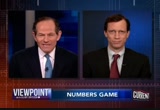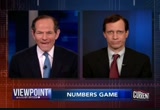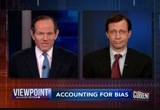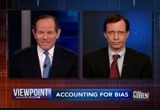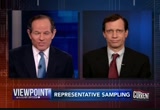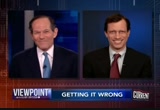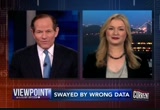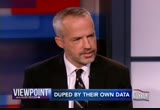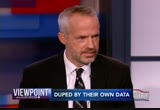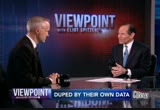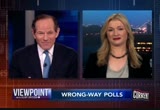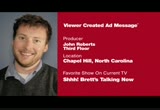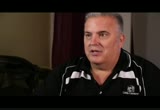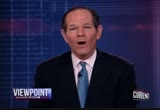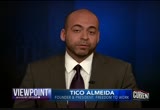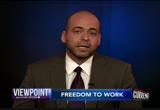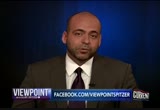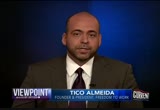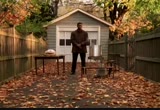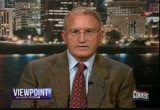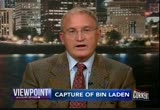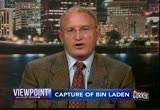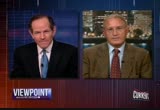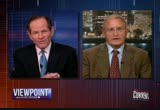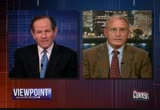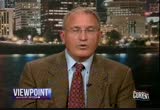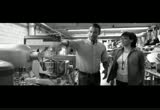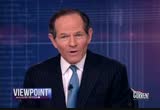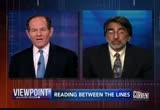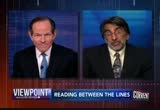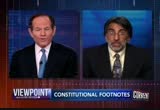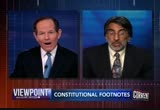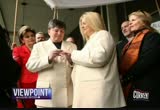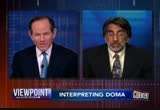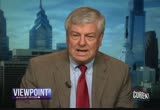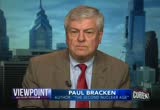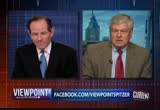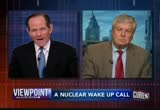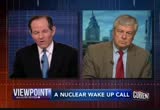tv Viewpoint With Eliot Spitzer Current November 21, 2012 5:00pm-6:00pm PST
5:00 pm
[ ♪ music ♪ ] [ ♪ theme music ♪ ] >> eliot: good evening i'm eliot spitzer, and this is "viewpoint." when you bet on a horse race you wouldn't want the racing form to misrepresent how the horses have run in the last few races. the process is supposed to be data driven and free of bias. so why then were so many polls this election year so wrong about the outcome? before november 6th most polls gave president obama clear edge over mitt romney but some polls that seemed to lean republican throughout the race favored the g.o.p. candidate. so much so that romney and his campaign staff many national republicans and fox news
5:01 pm
s" predicted the rates correctly said too many polls made too many assumption abouts the people they were attempting to poll. >> just going with what the data said instead of making assumptions is usually best practice when doing scientific survey. >> eliot: i'm joining with mark, senior editor of the "huffington post." thanks for joining us. >> thank you formation me un. >> eliot: polling is more than picking up the phone, calling 12 random people and adding up who said what? >> increasingly, when i started in this business 25 years ago you could do something like that. you could get a scientifically random sample, a few reasonable steps to make it rigorous and not have to do a whole lot of waiting or adjustment afterwards. now there have been a combination of things. lower response rates the whole
5:02 pm
cell phone problem basically two-thirds of us have two kinds of phones. another third roughly have a cell phone only, and it's a whole lot harder to know what the odds are getting someone over one phone or another. pollsters are having to make a lot of assumptions one way or another about either about the demographics of who they interview or the mechanism that they use to select it. >> eliot: i want to break this down a little bit. the moment you talk about waiting some answers more than others you're putting into play an opportunity for the pollster to exercise discretion that may be correct or incorrect or biased. i want to ask you the question why do you have to wait at all? is it because you want the 1200 to 2400 people to sample to reflect on those who end up voting on election day? >> in part. in part you want a sample of the representative of the demographics of the country.
5:03 pm
even if you're calling both cell phones and land landlines first you have to get that mix right. that's a tricky business. if you do that, because of the nature of who responds when the phone rings you're going to have not enough--too many white citizens not enough younger too many who are well educated, and you need to bring that into line with what we know from the census of what the population looks like. >> eliot: if you do your 1200 phone calls and suddenly 900 of them are male, you say wait a minute this is not the way the public looks. there way you have to overweight the female sample and underweight the male sample, and the moment you do that you're making assumptions about what the larger public looks liker and that's where there are kinks in the joints. >> sure, there are hard and fast statistics on what the mix should be, but with voters we never know for certain. we have some guidance from history, but what i think ends
5:04 pm
up happening in most polls, one way or another there is adjustment, there is subjective adjustment about that mix. either directly. either the pollsters saying quote/unquote a model that is going to be what percent black what percent young latino, whatever. or they're making a judgment about the mechanism. we're going to use this question or that question to judge who is enthusiastic, interested or whatever. >> eliot: let's say that you presumed, and you're doing your best to figure out what the latino vote will be as a percentage of the total vote. you say look, we think it's going to be 12% of the vote. so you want 12% of your sample to be latino. but it turns out only 10% of the vote is latino, then your numbers are going to be off. >> that's right, that's right. the more that--you know, it's becoming harder and harder for ordinary mortals like most of us to try to judge when a poll is okay or not and i think what
5:05 pm
pollsters are going to have to start doing is explain to us how they got to that result. on what basis did you--if you're making assumptions about the demographics what was the basis for that if you're relying on a voter mechanism, which is what nate silver was saying in that clip, how does that work? why should we believe that your enthusiasm and past voting is going to be indicative of the voting. >> eliot: it used to be that there was only was only the polling, what happened to them. >> gallup said they don't have a definitive answer and they're going to be looking at their administration. the one thing with gallup, they
5:06 pm
were calling cell phones and following most of the methodology that others are, so it's hard to gauge. i will say that it's more than their likely voter model. we're going to have a report looking into at some point soon about this at "huffington post." i think there is something about the way they were sampling the adults, not just the whole likely voter. >> eliot: i think they were using a phone book from 1968. senior polling editor for the "huffington post," thank you for coming on the program. >> thank you very much. >> eliot: for the political impact of the polls, good, bad and ugly on the 2012 election, i'm joined by tina dupuy and eric bolert. tina, let me start with you. are pollsters trustworthy are some becoming cheerleaders you have pollsters going on fox and
5:07 pm
saying we're winning. is that infecting this profession? >> i think so. first off as soon as people were told what they wanted to hear suddenly they wanted to hear more. they had their own particular pollster who they liked. so it became a niche market. 13 years ago we all thought that the information super highway would all make us geniuses. it turns out that we're just more informed, not better informed. we have more polls than we've ever had but not the best polls that we've ever had. >> eliot: one of the things that is amazing to me. if i'm running a campaign, a guy who is data driven, mr. analyst mathematician, i want accurate data. they seem to have believed their
5:08 pm
dream world and then they woke up and said, whoops, something went wrong. they fell in the trap that there was wrong data. >> fox news was sucked into the bubble. who was driving driving that request? rush limbaugh, fox news, who was reporting two days after the election that the romney campaign was shocked that they lost. have they never been to mark's site nate silver's site? romney traveled to ohio for 24 straight polls, why is he shocked? >> eliot: there were polls that showed him behind, but i got to believe that mitt romney was following real data and not believing what he wanted to believe, so he could make smart judgments. do you think they believed it? >> i think they did. the they think believe that the turnout would not be reflective
5:09 pm
of 2008. they thought that younger voters and african-americans would stay home. everybody hates barack obama that was the premise. >> eliot: tina, they had a different turnout model and presumption of how many latinos would vote. they knew they are were losing the latino vote. they just thought it would be smaller. they thought there would be a bigger white male vote. were these legitimate calculation on their part or were they kidding themselves the whole time. >> when dick morris said romney was going to win by a landslide and then after the election he said i said that to encourage people because they seemed kind of depressed. so maybe there was some of that. maybe there was some of "if we say this then it will make it true"." if we put it out there that we are going to win people who other words would have stayed home would come out and vote for romney. maybe there was a psychological
5:10 pm
reason for it. >> eliot: that works if you're trying to fool people on the outside. but it doesn't work to fool yourself because that game comes to an end on election day. >> it clearly different work. maybe that's why they did it. >> eliot: that's why i'm having a hard time. there is a methodology here that works. eric, why do you look at some of the polls rasmussen. >> i think it's part of a larger phenomenon. why do people watch fox news to be misinformed over and over. time and again their stories prove to be not true. rasmussen, whatever it is, great news for the republicans. it's splashed on the report and fox news talks about it all day. it's a short-term sugar rush, but this fantasy has an expiration date. votes were going to be counted.
5:11 pm
that's what has been amazing. you can argue that climate change does not exist. you can argue about all these kinds of things. >> cenk: did they say we won't know the truth about that for 100 years. >> you count the vote and everyone steps back and says, we were duped. the question was were we knowing knowingly duped? what was going on? a lot of conservatives were upset that they were misled by fox news. come on, again, they were voluntarily sucked into this premise. the landslide, that was fantastic. there was no data whatsoever. >> eliot: tina, i found one of the most amazing tv moments to be the karl rove refusing to accept that he was losing ohio, so he could live in the bubble and deny an objective reality. wait a minute, i've got a poll that tells me otherwise. no carl, go home and shut up. this is the methodology that i've seen on tv for quite some time. i was a candidate and i always
5:12 pm
wanted the real data, not the mythology but the real data. maybe they don't like reality. is this a republican psychological issue? >> no, i think this is consistent. science and republicans do not mix. >> eliot: and what is your theory nobody would challenge thethem as they try to craft the image of being the gold standard, but they were wrong over and over again. if you're a pollster like that do you recalibrate and say we need to look at you our method here. >> they were off badly in 2008. they were off badly in 2010. they missed badly pro obama and anti-obama. it has been running either way. dead last, rasmussen. having romney ahead 6 or 7 points with two weeks to go among likely voters, this is
5:13 pm
beyond--this is a whole other universe. you know, they have to fix it or no one is going to take them serious. >> eliot: tina, last question for you. we're hearing from mark before the cell phone-no cell phone this really is a fundamental divide. kids with cell phones don't answer the phone of strangers. they don't participate in the polls. is polling going to get harder and harder as the larger population moves to cell phone and cuts itself from these quite invasive half-hour long questionnaires that no one wants to answer. >> they're going to have to change their methodology. polling should get easier and easier as they have access to more people. more and more people are on the internet than ever before. more people are accessible to polling. they should have better data, not worse. my favorite from nate silver when he said four out of five dentists recommend something gallup is the fifth dentist.
5:14 pm
>> eliot: that's exacterly right. getting one of those phone calls is like a trip to the dentist. tina dupuy and eric boehlert, thank you both for your time. >> thank you governor. >> eliot: it may not have been a great election year, but message of the lgbt were thrilled with the results. yet the fight- fight-free equal you had goes on. everywhere. >> clarksville is a small town on the tennesse/kentucky boader and it is a really great place to raise a family. my name is lloyd allard i was a chief officer in the special forces, i was in the army for 23 years. i have made 1400 parachute jumps. well, my experience in the military was varied. i spent a lot of time in iraq, a lot of time in kuwait. i did two tours in iraq and i decided it was time to do something different with my life. i saw little caesars as a way to give something back to my family. the little caesars veterans program provides financial
5:15 pm
support and equipment when you open your store. the little caesars veterans program give me a sense of ownership and pride in my business because i am the owner of this business. did not have the business experience and little caesars provided the training and support along the way to get that experience. my family and i all work together in my little caesars stores. tanya and i have have four children and three of them are involved in the management of the little caesars stores. it's a real privilege to be able to work with them after so many years in the military i wouldn't see them for months on end now i get to spend every day working with them in the stores. my stores are very involved in the local community. we're involved in the little league programs and we're involved in the red cross. mr. and mrs. ilitch they founded little caesars are my personal heros because of the dedication they put into this program and the dedication they put every day in their lives into helping other people.
5:18 pm
>> michael: it's still >> eliot: it's still the ability to be >> eliot: among the many ways the election changed the landscape is it marked a turning point for gay and lesbian politics. america has it's first openly gay senator. plus lgbt votes helped make the difference in a tight presidential race. only 3.5 million votes separated the candidates. and yet, it is still legal under federal law in america to discriminate in hiring in employment on the basis of sexual orientation or identity. these are forgone conclusions for people of color and faiths
5:19 pm
but for the lgbt community the fight still rages on. with me tico, welcome to the show. >> it's great to go back. >> eliot: especially after the resounding successes you've had this year. one big win after another what made this happen? >> this year's election was a turning point for americans and our movement for fairness and for justice under the law. and i think president obama has proven once and for all that elected officials can take a strong stance in favor of lgbt fairness and not fear backlash from the voters. i'm not talking about his marriage equality, which is historic, his agencies put through dozens and dozens of changes things like hospital visitation, no discrimination in housing, and despite these wonderful advance there is was no backlash. the republicans didn't use this as a wedge issue. they didn't run ads on it. they didn't bring it up at the
5:20 pm
debate. there was silence. it means that we as gay americans, we're wedge no more. >> eliot: expanding rights for gays and lesbians, and now it's the ballot box where the public by majority vote say we're believe in this conception of civil rights. it's a fundamental and very historic wonderful thing to see. there is this gaping hole in federal law. explain why it is still there and what we wanted to do about it. >> congress for many years have been dragging its feet on a very simple bill to bandies crime ban ban discriminating for being gay. we expect real progress now that president obama has been reelected in terms of an executive order that will ban the companies that profit from federal contracts. that's almost one in four jobs
5:21 pm
in america. this will be a huge step forward and we're expecting it pretty soon. >> eliot: now just so people can understand many states have passed laws that extend the rights that we're talking about. but many states have not done that, and the federal government has not done that. we still have this hole that needs to be fixed. >> there is a patchwork of civil rights law. it is not the majority of states that have on the report thing. the right thing. giving a fair shot in holding a job not involving their sexual ororientation or sexual identity. >> eliot: even if you're not for same-sex marriage, you can be for the notion that you don't fire somebody because he or she or his or her sexual orientation. i've always been amazed that this issue has not been
5:22 pm
expanded. but you think we're going to get there. >> eliot: congress is behind the american people. and the exit polling shows it. there was polling of voters who actually voted a few weeks ago and three-quarters of voters think it should be illegal to fire somebody just for being gay or transgendered. they asked about the executive order to ban federal contractors, and there were 72% in support of obama signing that executive order. it's the right thing to do. he has promised to do it, and he has such a strong record on lgbt equality that i'm confident that the president will do the right thing in a short amount of time. >> eliot: i'm going to put you on the spot. the way you say you're confident that he's going to do it, maybe someone in the white house has whispered this is going to happen soon? >> no comment. i have total faith in the president to do the right thing especially on an issue like this. >> eliot: as you go back a number of months, this was an
5:23 pm
issue where the white house refused to sign the order and then went to the floodgates because joe biden went on national tv and set the president up and forcing his hand on the marriage issue. this would be poetic justice if this order were signed in short order. >> it would show and what happened last spring shows that those few folks in dc who are still afraid of gay issues and think that there is an consequence for supporting fairness for gay and transgender were wrong. we're going to have our very first openly lesbian senator tammy baldwin who will do a fantastic job pushing for strong jobs for all americans. and it matters so much that senators who might be centrist or still mulling over these
5:24 pm
issues will have a colleague that they see every day who they'll get to know, who will be there advocating for us, and that will make a tremendous difference as we push forward in the congress. >> eliot: that is right. what a year it has been. tico congratulations. you've been leading this fight for many years and a lion's share has to go to you. >> a lot of us have been fighting, and we're lucky to have straight allies, our family friend, coworkers who support us. it took more than 50% to affirm those marriage equality ballots so we're lucky to have so many allies, and we're going to win. >> eliot: founder and president of freedom to work who served as lead council on the non-discrimination act for the u.s. house of representatives. thank you for your time. >> thank you. >> eliot: new details on the mission that brought down osama bin laden.
5:25 pm
15 succeeded in setting their houses on fire. at christmas, there was a lot of driving over the river and through the woods. and a little bit of skidding on the ice and taking out grandma's garage door. so while you're celebrating, allstate will be standing by. trouble never takes a holiday. neither should your insurance. that's allstate's stand. are you in good hands? ♪ ♪
5:26 pm
before the sneeze, help protect with a spray. before the tissue, help defend with a wipe. before the cold & flu season help prevent with lysol. because when you have 10 times more protection with each hand wash... and kill 99.9% of germs around the house with each spray... those healthy habits start to add up. this season, a good offense is the best defense and lysol has your family covered
5:28 pm
of what might be called a new kind of warfare. the strike by seal team six was made possible by intelligence gathering in high tech and new age. it's a war in which there are no clear battle lines no uniforms, often no distinction between soldier and civilian, and where the ethics of old may not apply. joining me now national correspondent mark bowden, author of "the finish." thank you for joining us tonight. >> thank you eliot. >> eliot: you begin the book with a raid on an al-qaeda commander named muthana which led to the treasure trove of information that took us there. explain how there are little bits and pieces that created the web of the successful raid. >> that was the raid that
5:29 pm
general mcchrystal has cited as probably the most significant in the war in iraq because it basically delivered up a database of about 500 names of al-qaeda fighters who had come to iraq through syria. so not only were they able to take apart that organization by identifying all those folks and finding them, it also illustrated that the movement, the al-qaeda movement in iraq was primarily a foreign movement not an indigenous. that's one of the things that helped to turn the sunnies getsal al-qaeda. >> eliot: and you highlighted that they would use it and form and see linkages that might not have been possible to see many years back using new software and computer techniques that began to create--sort of out of a science fiction movie where you say these are the links these are the bank it's a and that's how you figure out who is who and where to go. >> well, more than that, eliot
5:30 pm
general mcchrystal, when he got all of this information took the unusual step of declassifying it, and posting it at the west point combat in terrorism website so anyone in the world could research this data for whatever they wanted. he just basically used the capability of the superintendent to draw on the talents of analysts from all walks of life, and all over the world to help him take apart this organization organization. >> eliot: he's almost the equivalent of open source intelligence, here's what you want to know. you figure it out for us. >> that story illustrates the cutting-edge nature of this war against al-qaeda, and finding osama bin laden is one of the most famous of the examples of what can be accomplished with this new method. >> eliot: now to go to the other end of the war on terror, and
5:31 pm
the battle that is still being waged, you recounted in the book how the president makes individual decisions about targets, and we are at a stage in war where we're using drones to target individuals including the u.s. citizen how does that fit into the traditional mode of war in terms of a president making these individualized decisions without judicial check, without congressional involvement, how does that fit into our history? >> well, it's a truly unique feature of modern times that the president of the united states is in effect actively engaged in the battlefield in combat. he has in effect a sniper rifle. each day he is given a dossier of an individual who has come into the crosshairs of the c.i.a. or military. on a regular basis has to decide whether to pull the trigger. obviously going after bin laden was the most famous
5:32 pm
example of the president doing this. the president has always had to make big decisions that is life-and-death sometimes for thousands of people. i don't think any president before obama had played such a regular and direct role on the battlefield. >> eliot: there is something different--i'm not quite sure if i can articulate but there is something different about making the decision on one specific person rather than we're at war with a nation, therefore send this military in to the coast to invade. it's a different type of subject call that the president is asked to make here. >> it is very direct, and also as the president told me, a tool that is very dangerous. it's relatively easy, and there is so little risk in targeting and killing someone anywhere in the world with this technology that i think due process some procedures and rules need to be put in place so that there are
5:33 pm
precedents and due process that administrations can follow in useing this tool responsibly. >> eliot: i think there will emerge shortly a consensus of what you said is exactly right. what is war almost becomes individualized assassination and there is a boundary line where due process is implicated, and we'll need to sort that out. was there a plan in place to bring bin laden back alive or that e- not going to be brought back alive. if he's there kill him? >> the president told me, and i take him at his word, that his preference was that he bring him back alive. he has fairly consistently argued and tried to get these top al-qaeda leaders before judges and criminal courts where you feels that's the appropriate venue for prosecuting these people. of course, he has been met with a great deal of political resistence with when he has
5:34 pm
tried to do that. for instance with khalid sheikh mohammed. they told me if they captured capturedbin-laden he would have the political capital to bring him to trial in federal court. having said that, you know those seals, their first priority is getting in and out of that compound alive. when they were fired upon as they approached the house i think that pretty much effective effectively sealed the fate of every adult male in the household because they were not going to wait around and see if someone was going to shoot at them. >> eliot: i think that's exactly right. of all the things you learned what was the most surprising? >> when admiral mcraveen outlined his plan to the president he argued if the seal team had tripped pakistan's defenses tripped their alarms, and his men found themselves surrounded by pakistan's armed forces and air force that he
5:35 pm
advised that they strong arm the compound and wait for washington to negotiate their extraction. it was president obama who said no, if you're going in, i want you to go in with enough force to fight your way out of the country if necessary. clearly that was embracing of a large risk. that was embracing the possibility of actually getting in a shooting war with pakistan. so it did surprise me that it would be the president who would demand that they go in in force as opposed to the military commander. >> eliot: that is fascinating because one presumes had there been a stand off that could have been negotiated out. fascinating and i'm sure there will be more, and maybe you'll write more about that as time goes on. mark bowden, author of the spectacular new book" the finish" the killing of osama bin laden. thank you for your time tonight. >> thank you eliot. >> eliot: the decision with the potential to impact every one of
5:36 pm
5:37 pm
5:38 pm
5:41 pm
>> eliot: from affirmative action to voting rights and possibly same-sex marriage the supreme court is set to way weigh in on a number of controversial issues this term. it is easy to say that i agree or disagree with any one of these policies. but the question for the supreme court will be more complicated whether they're constitutionally permissible or precluded. with me to explain the distinction the scholar of the day, professor of law professor, thank you for joining us. >> thanks for having me. >> eliot: begin by explaining this intellectual difference between agreeing and disagreeing with something and whether or
5:42 pm
not it's permissible or precluded. >> a lot of things that you might think are good policy but maybe the constitution prohibits them. on the other hand there might be a lot of stuff that you think really stinks but the people can vote for it because the constitution allows it. a lot of people thought obama-care was not perfect policy, but in my view it's clearly constitutional. >> eliot: in other words even though i might disagree with something, it may be constitutional, even though i may like it, the constitution may say no, you can't do it. >> that's why we have the constitution to settle different things, and it's not just a matter of what we believe is political opinion but a question of law. >> eliot: the supreme court decides a law such as the president's healthcare reform act, which i happen to like and think is constitutional, but chief justice roberts who whose vote
5:43 pm
says its constitutional. >> it was to be decided by the people and we just had an election about that. >> eliot: that is the difference between the presidential process, either with the congress or executive and the judiciary which has to make sure what we do is within these boundaries. let's take something like affirmative action and put it in that context. what is the constitutional issue when it comes to affirmative action. >> the tricky question is what those words equal protection really mean. do they surely prohibit the kind of apartheid policies that were condemned in brown versus board of education. those policies were designed to really stigmatize and put down to treat a second class of the blacks who had before that experienced generations of slavery and subordination.
5:44 pm
the same thing if they are used to up a racially outcome by bringing folks who have been previously excluded historically from the table, and bringing them to the table. >> now just so it's clear the supreme court has said until very recently there is no problem with using race as a factor in the context of higher education in particular to create a diverse intellectual environment. the question now before the court is will that continue to be the law? >> exactly. ever since the case in the late 1970s, so for 35 years the basic idea that race can sometimes be taken into account in order to achieve more diversity in higher education. and especially when this is not being used to stigmatize or subordinate historically disadvantaged groups like
5:45 pm
african-americans. >> eliot: and justice sandra day o'connor in voting for this when she was on the bench in her most recent decision said we think they can't continue for 25 years. we have not gotten to the end of the 25 years but clearly she was saying this was meant as a remedial effort to overcome history, as you just said, professor, a history of degradation and subordination. and a certain point they said you can no longer use race. are we at a tipping point where race is no longer an issue. >> that was a tipping point and though she talked about diversity and bringing people together, between the lines were remedial ideas going on as well as pure forward-looking diverse idea bringing folks together. one thing that was very important to her if you want a diverse military corp, where the
5:46 pm
you have to have constitutions institutions of higher he haddation, public and private, bringing races and cultures together. >> eliot: in same-sex marriage where there is an attack on the doma act. explain that one. >> well, that one was passed at a time when almost no states had same-sex marriage. now most states do, and the trend is in favor that have. three months three states joined the bandwagon, and california, the biggest state under judicial decree to allow same-sex marriage. as we see more and more states joining this bandwagon the federal policy that allows states--that says the federal government does not have to recognize that seems increasing increasingly weird, irrational and in some ways in violation of states rights.
5:47 pm
>> and here you have attention two states rights, and civil liberties that should exist for individuals to marry, and congress passing law that marriage is of individuals of different sex. it's not whether i like it or i don't like t it it, that's why we need the professor to explain this. >> if you're married under state law, why shouldn't you be married for social security purposes and income tax purposes. >> cenk: the supreme court says you must be, although we'll have to come back to pars the opinion and the votes, thank you as always for making the complex understandable. >> thank you. >> eliot: we've had 50 years of non-and nuclear war but is nuclear war more likely every
5:48 pm
5:49 pm
5:50 pm
refunded the difference. just use your citi card and register your purchase online. have a super sparkly day! ok. [ male announcer ] now all you need is a magic carriage. citi price rewind. buy now. save later. >> eliot: in a bipolar war nuclear arms strategy was he said to under and the doctrine of destruction led to a period of stability. as we end to a multi poller world, we head to a dangerous era. author of the new book" the second nuclear age: strategy, danger and the new power of politics." professor, thank you for joining us. >> good to be here. >> eliot: this is a grim forecast that you are giving to us. first explain why we have had
5:51 pm
stability and why that will change? >> well, the second nuclear age is the spread of nuclear weapons that had nothing to do with the cold war. one of the sources of stability back then was they only had two nuclear countries. both of them were conservative on anything that came to nuclear weapons. also you didn't have this mass hysteria in the street that we see often in certain parts of the world like south asia and the middle east. if you look back at the cuban missile crisis, you didn't find a million people demanding. now in the street, the emotions, the a hysteria of society can leap right up and influence what happens in the crisis. >> eliot: it sound to me two dimensional can be understood. we're now in the world of three- and 4-dimensions, and in
5:52 pm
the cuban crisis, the closest we came to an actual confrontation you argue decisions were made by reasonably conservative individuals, and you don't think in pakistan, india and other nations that will soon already have the bomb, that those cool minds are going to determine what they do with them? >> that's right. and there are two senses of this. first of all, in the crisis it could get out of control for just those reasons. the other thing we're already starting to see the kind of arms race that we saw back in the cold war in the middle east, in south asia, and in east asia. for example israel is shifting a good part of nuclear forces to see. now this makes sense. it's a good thing to do. the iranians are countering by mobilizing missiles and fixed silos to launch. we could go into details but i'm
5:53 pm
trying to rise above this and point out there are already strong interactions in these military systems and regions. >> eliot: as the number of nuclear nations increases does the inevitability of a nuclear confrontation almost make you certain there will be in the next 30, 40, 50 years a nuclear war? >> i'm not that pessimistic. the problem is the nature of the country. if you tell me that japan were to get nuclear weapons i wouldn't like it, or canada. but when you tell in iran will have nuclear weapons pakistan has doubled the size of its arrestagriculturearsenal, and that does give cause. >> eliot: pushing nonproliferation which you argue has failed, and you list its grown significantly and as well as we've reduced our nuclear stops, both the united states
5:54 pm
and russia to the point they're smaller than they used to be, but certainly sufficient right now. those are strategies of an earlier era and we need to think about new policies. explain. >> well, yes, that's exactly right. we got out of the cold war by building more nuclear weapons because it scared the daylights out of the other side, and frankly it scared the daylights out of us. we're not going to get out of this situation by building more weapons. if we built 50 new missiles it would not have an affect on north korea china or russia. we need new policieses. most forces have not been tested under realistic conditions in 20 years. it's basically junk in the attic. i'm not opposed to getting rid of most of it. we need to put out declarations of what the united states will do to prevent others were using nuclear weapons. so i'm very much in favor of the declaration that we will never use nuclear weapons first.
5:55 pm
what that opens up if someone does use nuclear weapons that suspends our pledge so we could use them to punish them. we need to redesign arms control. arms control is still built for the cold war but we have these talks that limit the forces of russia and the united states. that's not the problem today. the problem is pakistan and north korea. >> eliot: you're exactly right. i want to drill down on these. you're right. a bipolar treaty between the united states and russia is nice but does not confront the nations of the rogue nation that you're talking about, and how do we deal with them. a no-use first strategy sends the message we won't strike first, but you better be prepared for retaliation. would you use them against iran for instance. >> yes i am convinced it would
5:56 pm
influence iran because it would force the people and it's government to think through what they're doing. right now every move they make is celebrated through a good part of the world because its striking a blow on israel and the united states and others. i can't guarantee that they won't use nuclear weapons but i can gather tee that they guarantee that they'll have to think through the consequences of it. >> eliot: you want to say no matter who you may be, you will suffer the consequences that we said to russia in the 50s and 60s under that regime. how do you counter proliferation and stop the inevitable acquisition of nuclear weapons by nations where there is not the stability that we would oh hope to exist in a nuclear power. >> most countries still do not want a nuclear weapon, but technology has advanced so much today compared to the 1970s
5:57 pm
and 1980s that if a country wants nuclear weapons it's increasingly easy for them to do it. my argument in the book is that the great powers, the major powers like u.s. russia, china let's throw india into the group have got together and redefined arms control to get it away from this democratic 200-country nonproliferation regime, which was good for the 20th century. but in the 21st century we have to get together with china to suggest to these countries you're going to have u.s. china and russia on your neck, we'll all crackdown on you. that would be a very different arms patrol. >> eliot: and we have unity with russia and china. paul bracken, also author of "the second nuclear age." thank you for your time tonight. >> thank you. >> eliot: that's "viewpoint" for
136 Views
IN COLLECTIONS
CURRENT Television Archive
Television Archive  Television Archive News Search Service
Television Archive News Search Service  The Chin Grimes TV News Archive
The Chin Grimes TV News Archive 
Uploaded by TV Archive on

 Live Music Archive
Live Music Archive Librivox Free Audio
Librivox Free Audio Metropolitan Museum
Metropolitan Museum Cleveland Museum of Art
Cleveland Museum of Art Internet Arcade
Internet Arcade Console Living Room
Console Living Room Books to Borrow
Books to Borrow Open Library
Open Library TV News
TV News Understanding 9/11
Understanding 9/11
